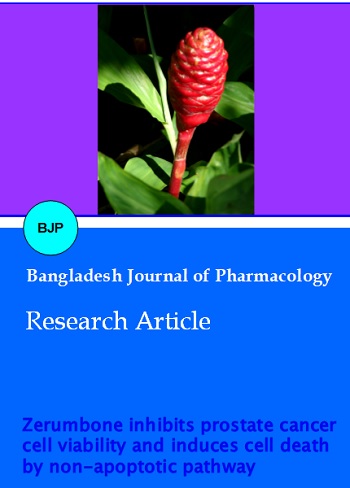Zerumbone inhibits prostate cancer cell viability and induces cell death by non-apoptotic pathway
DOI:
https://doi.org/10.3329/bjp.v11i4.26728Keywords:
Apoptosis, Prostate cancer cell, ZerumboneAbstract
The aim of the present study was to investigate the role of zerumbone on the proliferation, cell cycle arrest and cell death in DU-145 prostate cancer cell lines. The MTT assay revealed that zerumbone (20 µM) reduced proliferation of DU-145 cells to 39.0% at 48 hours. It also increased the proportion of propidium iodide stained cells to 53.4% compared 1.0% in control. However, the population of annexin V-stained cells remained uneffected indicating induction of non-apoptotic cell death by zerumbone. Treatment of DU-145 cells with zerumbone (20 µM) caused 8-fold enhancement in the level of reactive oxygen species (ROS). On the other hand, exposure of the zerumbone treated DU-145 cells to glutathione inhibited the generation of ROS. Fow cytometry using propidium iodide staining revealed that zerumbone treat-ment increased proportion of cells in G1 phase to 71.3% on compared to 34.7% in the control. The results from Western blot analysis revealed a significant increase in the expression of cyclin D1 protein in DU-145 cells on treatment with 20 µM concentration of zerumbone. Thus, zerumbone treatment inhibits prostate cancer cell viability and can be used for its treatment.
Video Clip of Methodology:
Western blot assay: 3 min 37 sec Full Screen Alternative
Downloads
282
152 Read
92 Feature
49

Published
How to Cite
Issue
Section
License
Authors who publish with this journal agree to the following terms:
- Authors retain copyright and grant the journal right of first publication with the work simultaneously licensed under a Creative Commons Attribution License that allows others to share the work with an acknowledgement of the work's authorship and initial publication in this journal.
- Authors are able to enter into separate, additional contractual arrangements for the non-exclusive distribution of the journal's published version of the work (e.g., post it to an institutional repository or publish it in a book), with an acknowledgement of its initial publication in this journal.
- Authors are permitted and encouraged to post their work online (e.g., in institutional repositories or on their website) prior to and during the submission process, as it can lead to productive exchanges, as well as earlier and greater citation of published work (See The Effect of Open Access).
